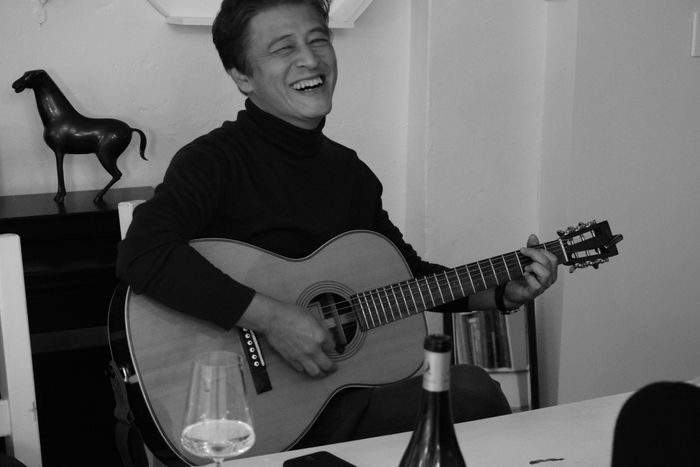
Like many of Hong Sang-soo’s main characters, the protagonist of Walk Up is a filmmaker himself. Byung-soo (Kwon Hae-hyo) is, like Hong, a respected maker of realistic, enjoyable comedies as well as the recent recipient of a major prize. He’s not much of a father, though. When he first rolls up to the small Seoul apartment building where Walk Up takes place, he’s in the company of his daughter, Jeong-su (Park Mi-so), whom, we soon learn, he hasn’t seen in five years. They’ve come to see the building’s owner, an interior designer named Ms. Kim (Lee Hye-young), who’s initially flattered to be visited by such an illustrious old friend — though her pleasure visibly dims as she realizes Byung-soo has looked her up in hopes that she’ll hire his daughter, who harbors vague aspirations of entering Ms. Kim’s field. Ms. Kim doesn’t live in the building, but she keeps the basement as a place to work and, as she puts it, to rest. By the time the trio make their way down there and Byung-soo abandons Jeong-su to attend a nearby meeting, it starts to seem as though Ms. Kim may actually use the cellar space to drink, which, in a Hong film, gives her plenty of company. Over what is definitely not their first bottle of wine, the two women talk about the absent Byung-soo and whether his big-shot persona or insecurity at home represents the real him. “Maybe the person he is outside is more genuine,” Ms. Kim muses, and over the course of this ingeniously constructed movie, you come to understand how much Byung-soo frets about this very thing.
The prolific Hong is famous for his long takes of alcohol-lubricated conversations, for playful narrative structures and tales of romantic disappointment, and for characters who work in the film industry. Walk Up (now playing in New York and Los Angeles) doesn’t represent any major deviation in that sense, but it’s uniquely pleasurable in how self-contained it is. It isn’t about the pandemic, but its compactness feels born of it anyway, as though the restrictions forced its narrative to grow up instead of out. There are four stories to Ms. Kim’s building, and the film unfolds in roughly four sections in which Byung-soo goes from being a guest at the second-floor restaurant to co-habiting in the third-floor apartment with the restaurant’s owner, a divorcée named Sunhee (Song Seon-mi), to becoming a deadbeat in the fourth-floor studio. The segments grow out of one another, yet, like a vertical anthology, they could be taken as a glimpse of what’s to come or as a flight of fantasy before everything folds neatly back in on itself. What links them, aside from the building, is Byung-soo’s anxiety about losing the status that comes with being a famous filmmaker and having to navigate the world after being exposed as the intensely flawed man he really is without that assumption of deference.
The higher up in floors Byung-soo goes, the more he regresses. He has two romantic partners during his time in Ms. Kim’s building; after Sunhee, he moves to the fourth floor and takes up with a real-estate agent named Jiyoung (Cho Yun-hee) who treats him like a baby to be fed and coddled. But Ms. Kim is the screen partner who really matters, one who starts off flirtatious and ingratiating and grows chillier with each rise in elevation. We get a sense of what she’s like as a landlord early on when she gives Byung-soo and Jeong-su a tour that includes a look at both upstairs apartments, inhabitants be damned, assuring her guests with bone-chilling cheeriness that “we live freely here.” Once Byung-soo moves in with Sunhee, Ms. Kim grows aloof, putting off repairs and clearly no longer seeing him in the same light since his retirement from filmmaking. By the time he’s living on the fourth floor and doing his best to dodge her, she treats him as just another wayward tenant. “Are you not making movies these days?” she demands. Ms. Kim may be transparent — she likes “successful people” and “submissive people,” a worker in the restaurant says — but in her overt calculations, she embodies everything Byung-soo fears.
It would be so easy to lose that protective padding of fame. For all of Walk Up’s delicious skewering of Byung-soo’s vanity and dread, the film is fueled by an awareness of the precarity of being an artist and the need to earn money that affects all the characters. Jeong-su studied art but has decided to make a go of interior design because she might actually be able to make a living with it. The unseen earlier fourth-floor tenant is an unsuccessful painter who can’t pay his rent, and Sunhee was a painter too until she gave it up to run a restaurant after deciding she was neither talented enough nor willing to cater, as she puts it, “to the tastes of rich, snobbish women” who presumably make up Ms. Kim’s clientele. But Byung-soo is working in the least pragmatic field of them all — making films that depend on the whims of investors — and the prospect of having his funding pulled sets the other stories in motion. Most of the recurring motifs in Walk Up, from mentions of Byung-soo’s beloved Mini Cooper to a romanticization of life overseas to the repeated talk of moving to Jeju Island, have to do with getting away. This makes the building the movie can’t seem to escape from seem all the more like purgatory, though the movie is buoyant and wry enough never to get bogged down by its main character’s flashes of dark panic.
More Movie Reviews
- The Thriller Drop Is a Perfect Addition to the Bad-First-Date Canon
- The Accountant 2 Can Not Be Taken Seriously
- Another Simple Favor Is So Fun, Until It Gets So Dumb


